Every year, millions of people are displaced due to disasters. Research has shown that displacement tends to exacerbate existing inequalities and is far from being gender-neutral. Gender—as it intersects with age, sexual orientation, disability, ethnicity, and other factors—inevitably shapes the lived experiences of displaced persons. Women and girls, constrained by social and cultural norms, often struggle to find livelihood opportunities and face barriers in accessing housing, education, and healthcare.
To discuss this further, the IGC Secretariat hosted the first Lunch and Learn discussion of the year on 8 February 2024, titled ‘Gender and Displacement: From Analysis to Action’. The event aimed to discuss the gendered risks and impacts of displacement, to explore the role of climate change as a vulnerability multiplier, and to discuss promising pathways for gender-responsive action.
The event featured Christelle Cazabat, the Head of Programmes at the Internal Displacement Monitoring Center (IDMC), and Andrew Harper, the Special Advisor to the High Commissioner for Refugees on Climate Action, as speakers. Shefali Gupta, a master's student at the Geneva Graduate Institute, moderated the discussion.

Cazabat initiated the conversation by referencing the IDMC's report on ‘The Gender Dynamics in Internal Displacement’, shedding light on the scarcity of data concerning internally displaced persons and asserting that effective practices stem from existing knowledge. She delved into the gender implications of internal displacement, noting that over 35.8 million women and girls have been reported as internally displaced, with detrimental impacts to their income, livelihoods and welfare.
Cazabat illustrated this with the example of educational disparities caused by displacement, revealing that displaced girls attend school less frequently than boys. This is attributed to displaced families' reduced income, forcing them to make difficult choices about which child to educate, often favouring boys. The discussion then shifted to Ukraine, where men reported a higher perceived risk to their safety due to compulsory military service, contrasting the experiences of women. Cazabat also mentioned the lack of substantial evidence on the risks faced by LGBTQIA+ and non-binary individuals in displacement, underscoring an area in need of further research and understanding. To conclude her presentation, she offered three pathways for action: collecting better gender data on internally displaced persons, developing gender-sensitive policies and programs around the world, and increasing the participation of internally displaced persons in decision-making processes.
Meanwhile, Andrew Harper shared his practical experiences, highlighting that there has been a long-standing fixation on identifying problems, gathering data, and evidence, with very little effort made towards addressing these issues. He suggested shifting the focus to "What now?" and proposed two calls to action. First, he emphasised the underrepresentation of women affected by crises in discussions and suggested that the solution lies in ensuring these women are represented in decision-making spaces. Second, he underscored the importance of providing women, the elderly, and children with the resources needed to be self-sufficient, recognising their agency, and empowering them to, in turn, empower their communities. He reiterated that while data is relevant, it is crucial to listen to the people affected and include them in the decision-making process. Harper concluded his presentation by urging decision-makers to adopt a people-centric approach.
Following the presentations, the audience engaged in thought-provoking discussions with the speakers. These conversations covered a range of issues, including the necessity of compassion for displaced people, the critical role of funding, and the importance of obtaining accurate data to formulate effective policies.
This event was part of the IGC 'Lunch and Learn' series, which aims to foster interactions between the IGC community, experts, academics, and activists. It is made possible by a grant from the US Mission and serves as a platform for dialogue and knowledge exchange. The events are open to IGC focal points, Champions, and the broader public, including students.

Catch the highlights here:
